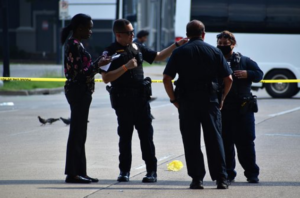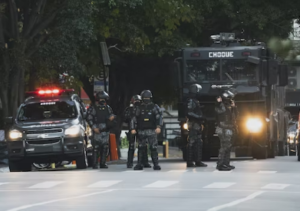Incident: Pulse Nightclub, Orlando, FL
Date: June 12, 2016
Casualties: 49 killed / 53 wounded
Learning from our past is a cornerstone of professional improvement. In an effort to improve police responses, BlueLogic wants to provide an overview of several key lessons learned and findings related to training and mental preparation from Rescue, Response, and Resilience: A critical incident review of the Orlando public safety response to the attack on the Pulse nightclub.
4 KEY FINDINGS RELATED TO TRAINING AND MENTAL PREPARATION
“Mindset is Key” – During after-action interviews, responders reported that the “mindset of first responders is key” to their ability to operate during the incident. They emphasized that command personnel and officers need to train and practice decision-making and tactics. The right mindset not only helps officers endure the intensity of critical incidents but also empowers them to navigate high-stress situations effectively. Failing to mentally prepare first responders would have been inadequate given the challenges they faced.
Pre-Event Training should include the Entirety of an Event – Training should go beyond neutralizing the threat and encompass the entirety of an event. Fortunately, Orlando Metro Police emphasized the need for Active Shooter training and adequately prepared their officers for the situations they encountered. This proactive approach not only focused on tactical responses to mitigate immediate threats but also underscored the importance of comprehensive preparedness.
Train for Communication Breakdowns – During the incident, first responders experienced poor communication between officers inside the hospital and command staff due to radio dead zones inside the hospital. Rather than allowing communication to break down, an officer was assigned to stand outside the hospital and manually relay information to ensure all parties stayed informed. By practicing scenarios where communication breaks down and immediate problem-solving is needed, personnel can learn to adapt quickly, ensuring a steady flow of crucial information during emergencies. This proactive training not only strengthens individual skills but also enhances the overall effectiveness of the team in handling unexpected challenges that may arise in critical situations.
Source: https://cops.usdoj.gov/ric/Publications/cops-w0857-pub.pdf
Straub, Frank, Jack Cambria, Jane Castor, Ben Gorban, Brett Meade, David Waltemeyer, and Jennifer Zeunik. 2017. Rescue, Response, and Resilience: A Critical Incident Review of the Orlando Public Safety Response to the Attack on the Pulse Nightclub. Critical Response Initiative. Washington, DC: Office of Community Oriented Policing Services.
Date: June 12, 2016
Casualties: 49 killed / 53 wounded
Learning from our past is a cornerstone of professional improvement. In an effort to improve police responses, BlueLogic wants to provide an overview of several key lessons learned and findings related to training and mental preparation from Rescue, Response, and Resilience: A critical incident review of the Orlando public safety response to the attack on the Pulse nightclub.
4 KEY FINDINGS RELATED TO TRAINING AND MENTAL PREPARATION
“Mindset is Key” – During after-action interviews, responders reported that the “mindset of first responders is key” to their ability to operate during the incident. They emphasized that command personnel and officers need to train and practice decision-making and tactics. The right mindset not only helps officers endure the intensity of critical incidents but also empowers them to navigate high-stress situations effectively. Failing to mentally prepare first responders would have been inadequate given the challenges they faced.
Pre-Event Training should include the Entirety of an Event – Training should go beyond neutralizing the threat and encompass the entirety of an event. Fortunately, Orlando Metro Police emphasized the need for Active Shooter training and adequately prepared their officers for the situations they encountered. This proactive approach not only focused on tactical responses to mitigate immediate threats but also underscored the importance of comprehensive preparedness.
Train for Communication Breakdowns – During the incident, first responders experienced poor communication between officers inside the hospital and command staff due to radio dead zones inside the hospital. Rather than allowing communication to break down, an officer was assigned to stand outside the hospital and manually relay information to ensure all parties stayed informed. By practicing scenarios where communication breaks down and immediate problem-solving is needed, personnel can learn to adapt quickly, ensuring a steady flow of crucial information during emergencies. This proactive training not only strengthens individual skills but also enhances the overall effectiveness of the team in handling unexpected challenges that may arise in critical situations.
Don’t Forget about Dispatch – Recognizing the toll on Dispatchers during high-stress incidents, OMP supervisors acknowledged the need for additional support, prompting the involvement of Department Chaplains to provide emotional assistance and ensure the well-being of the Dispatchers during and after critical events. To better prepare them, OPD’s pre-event training for Dispatchers included learning to mute phones to maintain emotional control for callers, focusing on keeping victims calm, and obtaining and relaying critical information. During critical incident training, it is vital to include Dispatchers to ensure they are prepared for the professional challenges they will face during a mass critical incident.
Source: https://cops.usdoj.gov/ric/Publications/cops-w0857-pub.pdf
Straub, Frank, Jack Cambria, Jane Castor, Ben Gorban, Brett Meade, David Waltemeyer, and Jennifer Zeunik. 2017. Rescue, Response, and Resilience: A Critical Incident Review of the Orlando Public Safety Response to the Attack on the Pulse Nightclub. Critical Response Initiative. Washington, DC: Office of Community Oriented Policing Services.


